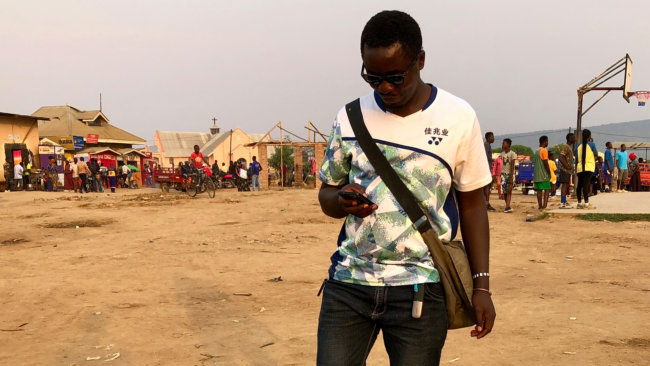
Innovations Studio’s Beyond Place Studio is collaborating with Opportunigee to design and build a ‘village pilot’ project which will house 500 recently resettled refugees in the Nakivale Refugee Settlement in Uganda. The project aims to integrate innovations and technology that increase access to critical resources while also creating dignified housing and vibrant public spaces. Through their partnership, InnovationStudio introduced Opportunigee to goTenna to test goTenna products in the Nakivale Refugee Settlement in Western Uganda.
Opportunigee, an entrepreneurship hub based within the Nakivale Refugee Settlement was co-founded by two brothers, refugees from the Democratic Republic of Congo. The organization addresses the lack of refugee-led entrepreneurship and education by providing entrepreneurial education, life coaching, and mentorship for refugees, known as ‘Opportunigee scholars’. The hub itself is located in one of the largest refugee camps in the world, home for over 130,000 people. Technology and communication is a focal area of Opportunigee with scholars exploring opportunities for improved global and local communications. For example, a Shared Studios portal in Nakivale allows Opportunigee’s co-founder Raphael Muvunga to connect with a global community for discussions about entrepreneurship.
With over 100 Opportunigee members and a desire to stay connected during the frequent cellular disruptions and recent government initiated internet shut down there is a demonstrated need for a technology for off-grid communication. The team was looking for a low-cost and easy-to-learn technology that would help them communicate in areas without cell service or internet connectivity.
Base Camp – The Challenge
Nakivale has a fast-growing population and even though many of the residents don’t have income-generating activities, they have been able to pay for a new phone (starting at the cost of $5) in order to communicate with each other or with relatives abroad. As the population has grown over the last several years, the cellular coverage has gradually become even more congested. Many Opportunigee members only have connectivity through an internet connection at Base Camp. Individuals can buy ‘bundles’ most commonly known as ‘pay-as-you-go’ data plans through two or three major providers that operate in the settlement, but the data is costly and cell coverage is limited. Access to communication is still a privilege to most inhabitants.
Director of Nakivart William Butula, Muvunga as well as the team at Innovations Studio were looking for a way Opportunigee could overcome their day-to-day connectivity limitations. In September 2020, the Innovations Studio Beyond Place Studio team discussed goTenna Mesh’s potential to bridge some of Opportunigee’s communications gaps.
Base Camp – The Solution
By December 2020, Innovations Studio sent eight goTenna Mesh units to the Nakivale Refugee Settlement in Uganda for ongoing use and testing of goTenna Mesh. Muvunga first tested the units at the crowded Base Camp. In this scenario, one goTenna Mesh unit was attached to a backpack while the other was attached to an operator’s waist. Nakivale is Uganda’s oldest refugee settlement, established in 1960 with many of the residents living there for decades. Base Camp is the main economic zone of Nakivale and is the primary entry point for newly resettled refugees.

Base Camp – The Results
Due to an obstructed line of sight, the maximum distance between two users to maintain a connection was 200 meters. When the two users placed a Mesh relay node in between them on a water tank six meters tall, the signal was still blocked by homes and other structures. The maximum distance for a successful test remained 200 meters.
However, while the week-long goTenna Mesh test was taking place, the government of Uganda completely cut off internet access from Uganda residents to the rest of the world two days prior to the general election on January 13th. This meant that using Google or Whatsapp was no longer an option but it was an opportune time for Opportunigee to test the goTenna Mesh units since they already had the goTenna app installed on their mobile phones. Although they couldn’t connect with everyone across the refugee settlement, it was a relief to be able to communicate with each other through the goTenna Mesh network. During the time the internet was shut down they used the devices to coordinate meetup points since the goTenna map app features were still functional even without the internet.
The team also used the devices when traveling in two different vehicles throughout Nakivale and the connection worked well, the team members could text or use the ‘Shout’ feature without any challenges.

Rubondo – The Challenge
The second goTenna Mesh test took place in the neighboring area of Rubondo located 8.5 miles (13.8 km) from Base Camp, where Nakivale residents have to walk away from their villages to access cell phone connectivity. Opportunigee team members working in the field on building and art projects have no way of asking for supplies, directing their staff or keeping track of their collaborators unless it’s by word of mouth. The access to connectivity becomes even worse during the night or in emergency cases. Rubondo is located in a remote area of the settlement where people don’t always have direct access to transport and medical services.
In this location, Opportunigee is partnering with InnovationStudio’s Beyond Place Studio to co-build a new community of homes, community spaces and improved amenities for water, sanitation and energy with a goal of creating more dignified housing and vibrant public spaces for resettled refugees.


Rubondo – The Solution
The second goTenna Mesh test was conducted in Rubondo between two rural villages spaced almost one kilometer apart. One user had a goTenna Mesh device on their motorcycle while another goTenna Mesh user was holding their device in their hands while on foot.
Rubondo – The Results
During this test, Muvunga successfully used the goTenna Mesh unit using the ‘SHOUT’ or ‘Chat’ feature to send messages to all active mesh units at once, the GPS feature for locating his teammate as well as general one-on-one communication with team members, signaling workers who would later kick off the village pilot project. goTenna Mesh allowed the test users to maintain communication with each other despite having no cellphone coverage or internet connectivity. According to the goTenna Mesh test team, the mapping feature within the goTenna app showed more terrestrial detail than the map in the Google Maps app.
“I consider goTenna Mesh a great device of communication specifically in remote areas. You can communicate using a smartphone without the internet or cellular coverage all while having access to an offline map showing the exact location of your team.”
Raphael Muvunga, Co-founder, Opportunigee

The Opportunigee team found that the most useful feature was the ability to send text messages to each other without relying on cell phone or wifi connectivity. Moving forward, Opportunigee will be teaching their team members how to use the goTenna Mesh units so they can stay connected throughout the development of the village pilot project with Innovations Studio. They will also keep devices with the goTenna Mesh app pre-installed on member’s mobile phones at Base Camp in case of future internet outages. The team believes that this device also has inter-organizational potential: multiple humanitarian aid workers can hop onto the mesh network and communicate with Opportunigee members within just a few minutes of pairing to their respective goTenna Mesh devices via bluetooth.
Next up, the same test group will explore creating a goTenna Mesh relay trail of devices connecting Base Camp and Rubondo. The “string” of relays will consist of goTenna Mesh devices inside of waterproof pouches containing a solar-powered battery, located at heights that avoid line of sight obstruction. The devices will be placed roughly 200 meters apart between each other and set to relay mode.
Lastly, the team will look into the possibility of carrying out transactions in areas with remote to little connectivity over a goTenna Mesh network.



Thanks to William Butala and Raphael Muvunga for their contributions. Thanks to goTenna for their collaboration and providing the Mesh products.




